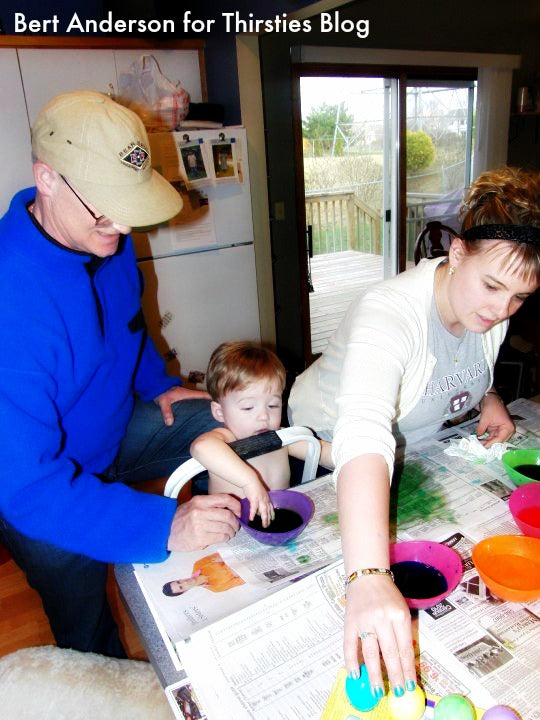Unnatural food coloring is a
hot topic out there and while there isn't any firm evidence from the
FDA (the US Food and Drug Administration) you can't deny that biting into a bright pink deviled egg is less than appetizing. In the past the FDA has
banned the use of Orange Number 1 and Red Number 2 finding the first to be toxic and the second to be a carcinogen. There have also been
studies out there linking some food dyes to the increased number of children with ADHD. All I'm pointing out is that you might as well stay on the safe side and use the dyes out there that Mother Nature gave us.
How do you dye eggs naturally? From the research that I've done I've found that there are two ways to dye eggs naturally: Hot Dye Method and Cold Dye Method. The Hot Method for dyeing uses the natural dye as part of the boiling part in hard boiling the egg. Basically you place the item you're going to use to dye the egg, like a beet, and boil the vegetable for about 15 minutes. Then, use a hand held strainer to get the plant particles out of the dyed water, add the eggs and enough water to cover the eggs. After that add a little vinegar (most things I've read have said 1/8 cup) into the beet-dyed water and begin boiling again. This time you're dyeing your eggs and hard boiling them at the same time. The Cold Dye Method is basically your standard way of dyeing eggs: hard boil the eggs first, make your dye (the same way you do with Hot Dyeing Method) and then add the egg to the already cool dye. The longer you soak the egg the more vibrant the color will be. Obviously, if you are going to let the egg soak for more than an hour you should place it in the refrigerator.
Here are some recipes for dyeing eggs naturally: Dirty Gourmet's
Natural Dyed Easter Eggs Itsy Bitsy Foodie's
Natural Easter Egg Dyes Food Network's
Natural Dyes for Easter Eggs Recipe




thank you for this great tip. Easter has already passed but I will definitely be looking into other colors besides red/maroon that I can dye naturally. I am all for using all natural anything over something that may be toxic but I’m curious as to why it might be 100% necessary since I thought dying eggs was just dying the outer shell? Maybe I’m wrong but I never seen an actual egg the part that you eat dyed a color.
I definitely want to try this next year! DD was too young this year.
Wow! Didn’t realize you could get such vibrant colors with natural dyes.
This is great! Thanks for the info. I like the idea of natural dye just because it’s cool for kids to see that you can do that.
Thanks for the ideas!
You're viewing 6-10 of 44 comments